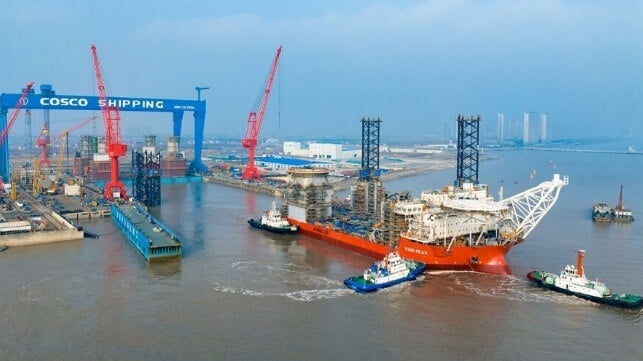Cadeler’s Massive Wind Turbine Installation Vessel is Launched

The first of the two new massive wind turbine installation vessels ordered by Cadeler was floated out at the Cosco Shipyard in China. The vessels are part of the company’s future fleet and with an increased size are designed to improve the efficiency of installation projects and handle the largest wind turbines.
The first of the vessels, Wind Peak, was floated out at the Cosco yard in Qidong, China on January 3. Cadeler highlights it as a milestone after two years of engineering work and 18 months of construction. The hull of the vessel is complete and it will now begin the final phase of construction which will include installing the jacking legs and cranes. The construction timetable calls for the vessel to undergo sea trials in mid-2024 and be delivered in the third quarter of this year.
The Wind Peak rivals Jan De Nul’s massive jack up vessel Voltaire which was billed as the largest ever for the offshore wind sector. The specs for the Wind Peak highlight that she has a maximum payload of over 17,600 tons compared to the rated 16,000-ton payload for the Voltaire. Wind Peak’s cranes have a 2,600-ton lift capacity to Voltaire’s 3,200-ton capacity although the actual capacity varies based on the jack up height and other factors.
Cadeler highlights its new vessel is designed to operate at some of the most difficult sites. Its increased transit capacity with 5,600 square meters of deck space means it will make fewer transits decreasing installation time and the associated costs. It will be able to transport and install seven complete 15 MW turbine sets at a time or five sets of the newest 20-plus MW turbines.

Wind Peak will have the largest capacity permitting it to carry more turbines to the site at one time (Cadeler)
Dimensions on the vessel are a length of 531 feet (162 meters) and it can operate water depths greater than 230 feet (70 meters). It has accommodations for 130 people and a nod to the drive to decrease emissions the vessel has a 5.4 MW battery and can also use shore power in port. It is also being built ready to adapt to future fuels.
Cosco highlights that it using new construction processes for the vessel which has permitted it to reduce dock time during construction by approximately a third. They also note the vessel’s advanced design means that it could also be used in dismantling projects and for recycling worn-out parts or installations.

that matters most
Get the latest maritime news delivered to your inbox daily.
The Wind Peak will be followed by a sister ship the Wind Pace which is scheduled for delivery in the second quarter of 2025. In addition, having completed the acquisition of Eneti through the merger, Cadeler also gains the Nessie and Siren, the two large installation vessels that Eneti ordered from the shipyard that is now Hanwha Ocean in South Korea. These two vessels will also each have 5,400 square meters of deck space and a maximum crane capacity of 2,600 tons.
The combined company says when it completes these four new builds plus two wind foundation installation vessels also ordered by Cadeler, it will have the largest dedicated wind installation fleet. The company will have six newbuilds as well as four existing vessels for a total of 10, after Eneti sold off its oldest vessels which had been acquired with the acquisition of Seajacks.
